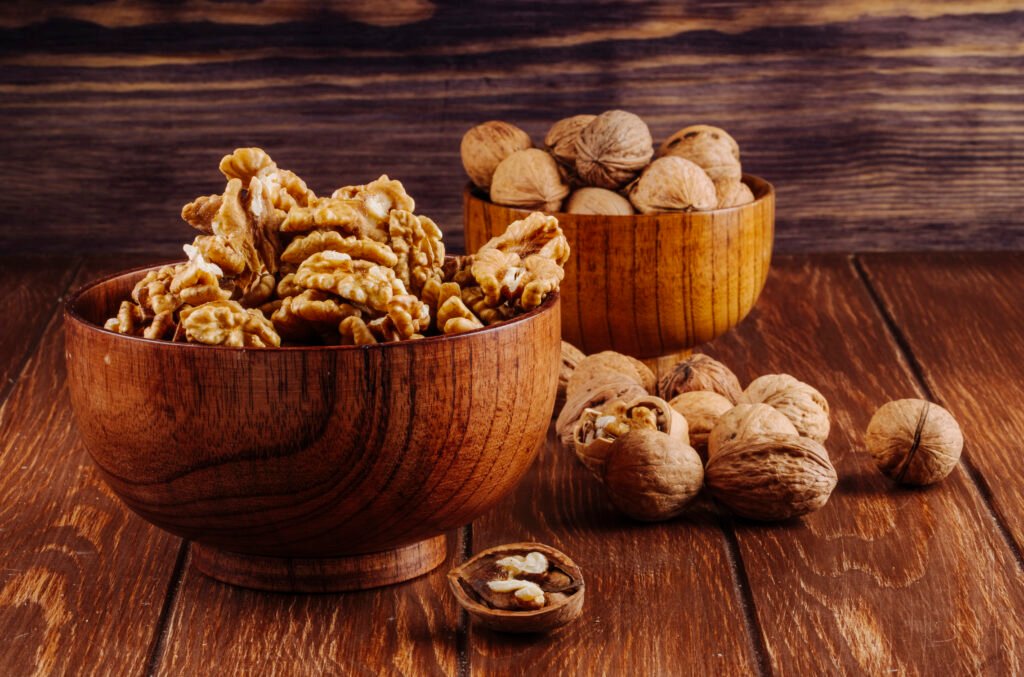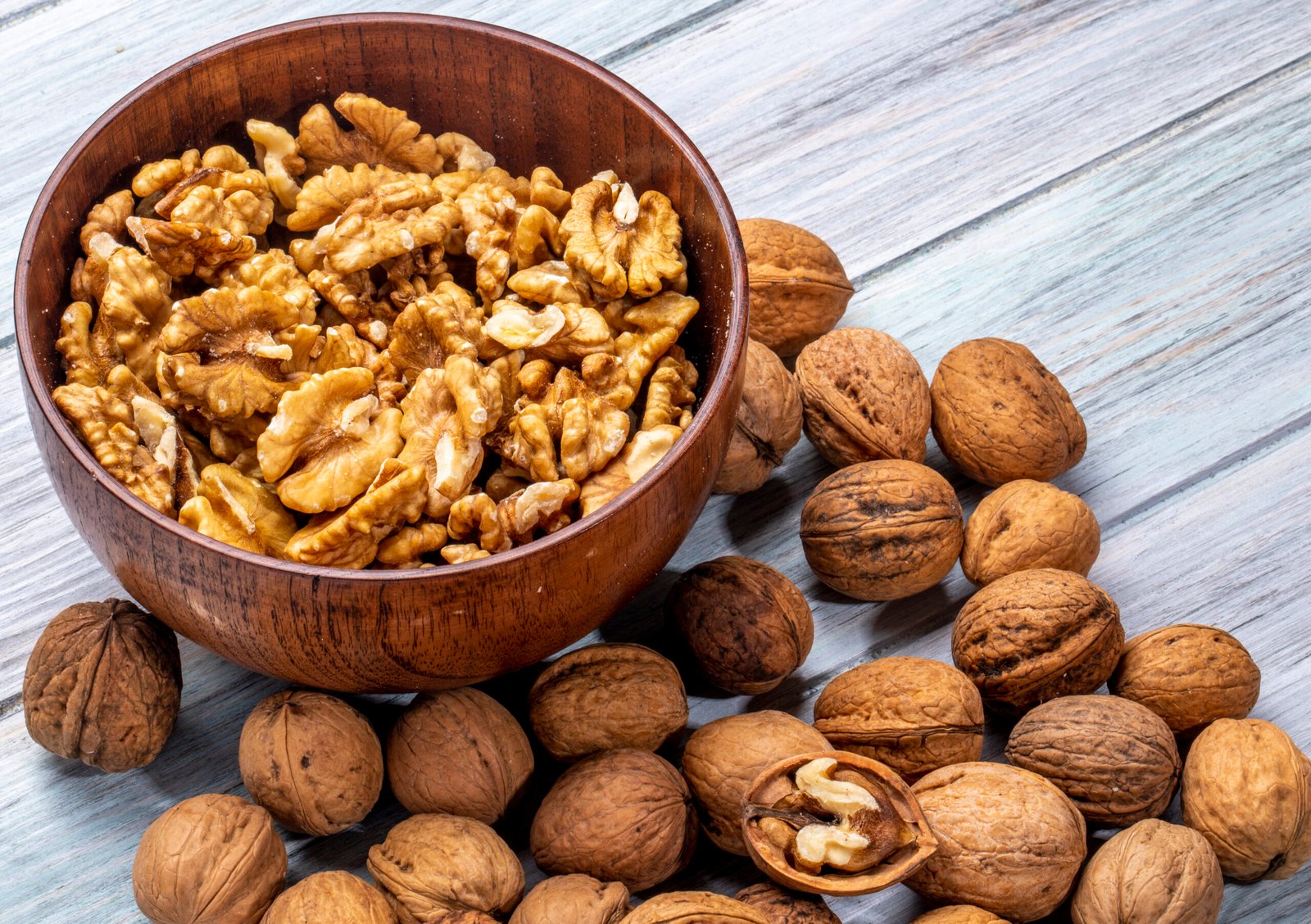Diabetes is a long-lasting health condition where the sugar level in your blood gets too high. There are mainly two types: type 1, which starts usually in childhood, and type 2, which often starts in adulthood. Type 1 needs insulin shots, while type 2 can often be managed with lifestyle changes like diet and exercise.
Nowadays, more and more people are getting diabetes because of things like not moving around enough and eating too much unhealthy food. In fact, millions of adults around the world have diabetes, and this number is expected to keep going up unless we find better ways to prevent and treat it.
Walnuts are super nutritious nuts that offer a bunch of health benefits. They’re loaded with good fats, protein, fiber, vitamins, and minerals. These nuts are especially rich in omega-3 fatty acids, which are great for your heart and brain. Plus, they’re packed with antioxidants that fight inflammation and protect your cells from damage.
Walnuts also provide essential nutrients like vitamin E, magnesium, and phosphorus. Adding walnuts to your diet can help improve your heart health, boost brain function, and even aid in managing your weight.
The Relationship Between Walnuts and Diabetes
Walnuts can be a good choice for people with diabetes. Even though they have healthy fats and calories, they’re low in carbs and full of fiber and protein. These qualities can help keep blood sugar levels steady.
Plus, the healthy fats in walnuts, like omega-3s, might make insulin work better and reduce inflammation, which is important for managing diabetes. But, it’s important to eat walnuts in moderation as part of a balanced diet to avoid consuming too many calories.
Overall, adding walnuts to your meals or snacks can be a tasty and nutritious way to help control blood sugar and support your overall health if you have diabetes.
Potential Benefits of Walnuts for Diabetes

Steady Blood Sugar: Walnuts have lots of fiber, protein, and good fats that help keep your blood sugar levels stable, so you don’t have big spikes after eating.
Better Insulin Sensitivity: The omega-3 fatty acids in walnuts can help your body use insulin more effectively, which means your cells can absorb sugar from your blood more easily.
Healthy Heart: Walnuts contain stuff like ALA and antioxidants that are good for your heart. They can lower bad cholesterol and reduce inflammation, which is important because diabetes can increase the risk of heart problems.
Weight Control: Even though walnuts have calories, they make you feel full, so you eat less overall. This can help manage your weight, which is important for diabetes management.
Less Risk of Complications: The antioxidants in walnuts protect your cells from damage caused by high blood sugar levels, reducing the risk of complications like nerve damage and eye problems.
So, adding walnuts to your diet can be really beneficial if you have diabetes. Just remember to enjoy them in moderation and as part of a balanced diet to get the most out of their health benefits.
Read more: About walnut
How many walnuts should a diabetic eat daily?
For someone with diabetes, having about 1-2 ounces of walnuts daily can be a good idea. This usually means eating around 14-28 walnut halves. This amount gives you a nice mix of healthy fats, protein, fiber, and essential nutrients without adding too many calories.

Remember to keep an eye on portion sizes, though, because walnuts are quite high in calories. Eating too many could lead to weight gain, which isn’t great for managing diabetes.
Also, go for plain walnuts without added salt or flavors to keep things healthy. And if you have any allergies or tummy troubles, it’s a good idea to talk to your doctor before making walnuts a regular part of your diet.
Overall, adding a small handful of walnuts to your daily routine can be a tasty and nutritious way to help manage diabetes and keep you feeling good.
What is the best time to eat walnuts?
The best time to eat walnuts can vary depending on personal preference and dietary habits. However, there are a few times when enjoying walnuts can be particularly beneficial:
As a Snack: Walnuts make for a nutritious snack between meals. Eating a small handful of walnuts as a snack can help curb hunger and provide a quick boost of energy.
With Breakfast: Adding walnuts to your breakfast can be a great way to kick-start your day with a dose of healthy fats, protein, and fiber. You can sprinkle them over oatmeal, yogurt, or cereal for extra crunch and nutrition.
In Salads: Walnuts add a delicious crunch and nutty flavor to salads. Including them in your lunch or dinner salads can enhance both the taste and nutritional value of your meal.
With Desserts: Walnuts can also be incorporated into desserts like cookies, cakes, or brownies for added texture and flavor. However, it’s essential to enjoy desserts in moderation, especially if you’re watching your sugar intake.
Before Bed: Some people find that eating a small serving of walnuts before bed helps keep them feeling full and satisfied throughout the night. However, be mindful of portion sizes to avoid consuming too many calories close to bedtime.
Ultimately, the best time to eat walnuts is whenever it fits into your daily routine and dietary preferences. Whether you enjoy them as a snack, part of a meal, or in your favorite recipes, walnuts can be a delicious and nutritious addition to your diet.
Read more: Benefits of Walnuts
Conclusion:
In conclusion, walnuts can be a valuable addition to a diabetic diet due to their nutrient-rich composition and potential benefits for blood sugar control. Incorporating moderate portions of walnuts into meals and snacks can provide essential nutrients and help support overall health and well-being.
FAQs
- Can walnuts cure diabetes?
- While walnuts can be part of a healthy diet for individuals with diabetes, they cannot cure the condition. However, they may help manage blood sugar levels when consumed as part of a balanced diet.
- Are all nuts good for diabetes?
- Many nuts, including walnuts, can be beneficial for individuals with diabetes due to their nutrient content and low glycemic index. However, it’s essential to consume them in moderation and be mindful of portion sizes.
- Can eating walnuts help with weight loss?
- Despite being calorie-dense, walnuts can be included in a weight loss diet when consumed in appropriate portion sizes. Their high fiber and protein content can help promote satiety and reduce overall calorie intake.
- Are there any risks associated with eating walnuts for diabetics?
- While walnuts are generally safe for individuals with diabetes, consuming excessive amounts may lead to weight gain and adverse effects on blood sugar control. It’s essential to monitor portion sizes and overall calorie intake.
- Can I eat walnuts if I have nut allergies?
- Individuals with nut allergies should avoid walnuts and other tree nuts to prevent allergic reactions. It’s important to consult with a healthcare professional for personalized dietary recommendations.
